The last case Tarrant County District Attorney Tim Curry personally prosecuted was the infamous murder trial of Cullen Davis. The millionaire oilman was acquitted in 1977, in one of the most expensive and high-profile cases in Texas history.
 By his side throughout the case was a guy he’d known since junior high school, top assistant Joe Shannon, who led the criminal division of the D.A.’s office for six years, then would come back from private practice to spend another decade as head of the office’s economic and computer crimes unit.
By his side throughout the case was a guy he’d known since junior high school, top assistant Joe Shannon, who led the criminal division of the D.A.’s office for six years, then would come back from private practice to spend another decade as head of the office’s economic and computer crimes unit.
So when Curry passed away in April, after a long battle with lung cancer, it wasn’t a big surprise when Shannon was named to succeed him – except to Shannon himself, at least the way he tells it.
He wasn’t planning on putting his name in the hat, Shannon told a group of journalists recently, until aides to Gov. Rick Perry encouraged him to do so. Even then, he didn’t think his application would be taken seriously, he said, because he waited until the last possible minute to apply.
He was at a conference in New Orleans not long after that, when one of Perry’s people called. The governor needed to meet with him the next day. On no sleep, he flew to Austin, arrived early, and sat in the waiting area of the governor’s office. But instead of meeting with Perry, Shannon got the news from a staffer: He had the job, without ever having been interviewed or spoken a word with Perry about it.
So with that much fanfare, Tarrant County had a new D.A. for the first time in 36 years. That might be the easiest day Joe Shannon will have in his new job.
He has taken on the running of one of the largest prosecutors’ offices in the state, with a budget of more than $35 million and more than 300 employees. Every year, more than 45,000 criminal cases, large and small, are crunched through its cogs of justice.
It’s an office with a sterling reputation – but one that may have been showing some tarnish in the last few years. And now, in addition to their usual caseload, prosecutors are handling a fresh influx of mortgage fraud cases. Plus, Shannon will have to decide over the next few months whether he wants to run for election to the office next year, with at least one potential high-profile opponent already in the wings.
That was the first query the journalists tossed at him at the recent get-together – will he run?
“Don’t I at least get a warm-up question?” he joked.
After 45 years of experience as a lawyer? Nah.
The questions came at a meeting of the Society of Professional Journalists at Joe T. Garcia’s Restaurant last month. After the greasy nachos and plates of enchiladas had disappeared, and margarita and beer glasses had been refilled, Shannon stood up and proceeded to charm his audience for about 20 minutes.
Shannon is 67, with an average build and a full head of gray hair, a soft voice, and an affable manner. His effortless charm is a stark contrast to his melancholy predecessor. Another related difference is that, by all reports, Curry hated campaigning and politics. Shannon is a natural.
According to Jack Strickland, Shannon’s longtime friend and former co-worker at the D.A.’s office, Shannon’s gregarious nature is not an act.
“One of the nice things about Joe Shannon is that he didn’t have one persona in the courtroom and another when he was dealing with administrative issues in the office and another persona when he was out after work having a beer,” Strickland said. “What you see is what you get.”
Shannon’s personal life has been, at times, the stuff of Hollywood movies. His ex-wife Carol is famous for belly-dancing her way around the world with former U.S. Rep. Charlie Wilson. After their divorce, her charms famously helped the Egyptian defense minister decide to sell arms to Afghan rebels fighting the Soviet invasion of their country, as depicted in the movie Charlie Wilson’s War.
Shannon grew up in the Ridglea area of Fort Worth. He and Curry both attended Monnig Middle School and then went to Arlington Heights High School. Curry was a year older, and the two ran with different crowds, but their parents were friends and the two families often met socially. Curry, Shannon said, was a much better basketball player than he ever was.
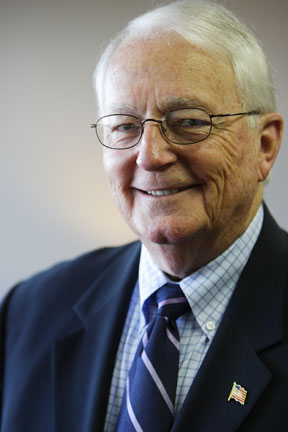 After high school, Shannon attended the University of Texas at Austin for both his undergraduate and law school studies. Less than a year after law school, while practicing law with his father, he decided to run for the Texas Legislature, following in his father’s footsteps. He was elected three times and suffered his first political loss in 1971, in a runoff for a state senate seat.
After high school, Shannon attended the University of Texas at Austin for both his undergraduate and law school studies. Less than a year after law school, while practicing law with his father, he decided to run for the Texas Legislature, following in his father’s footsteps. He was elected three times and suffered his first political loss in 1971, in a runoff for a state senate seat.
In eight years in the Texas House, Shannon sponsored the legislation that allowed probation to be granted in misdemeanor cases. At the time, a criminal could get probation for a felony but not for a misdemeanor. “If you stole the car you could get probation, but if you just stole the hubcaps you couldn’t,” he said.
He authored the statewide library act, which organized local libraries under the umbrella of the state, thus making it easier for library branches to lend books to one another. And he was on the committee that overhauled the state’s code of criminal procedure, making the system more efficient and ethical.
After losing in the senate race, he took Curry up on a job offer, to head the criminal division of the Tarrant County D.A.’s office. He intended to stay in the job only for a couple of years, he said, but after his father, who was also his law partner, died, he decided to stay on in the public office. And then there were the 14 months he spent helping prosecute Cullen Davis – his only loss in a death-penalty case. After seven and a half years, he left for private practice.
Losing that senate election and spending so much time at the D.A.’s office were the best things that ever happened to him, Shannon said, because that was where he learned to be a trial lawyer.
Strickland said that Shannon’s high standards and work ethic made such an impact on his career that he and several other young attorneys in the D.A.’s office during those years referred to themselves as “Shannon’s Boys.”
“We were all hard-charging trial lawyers,” he said. “We were taken under Shannon’s wing. We just wanted to try as many cases as we could, as well as we could. And there was no better trial lawyer in the office than Joe Shannon. He was so thorough, and he’s always been ethical to a fault. That goes hand-in-glove with being a good trial lawyer.”
Strickland said Shannon was quick on his feet at trial and connected easily with jurors. He was always prepared and had an innate sense for picking out the strengths and weaknesses of a case.
“He was very well-prepared [and] very folksy – as he still is – and that enables him to relate to and communicate very effectively, not only with witnesses, but also with jurors,” he said. “But underneath all of that, Joe is pretty hard-nosed. No one is going to push Joe around.”
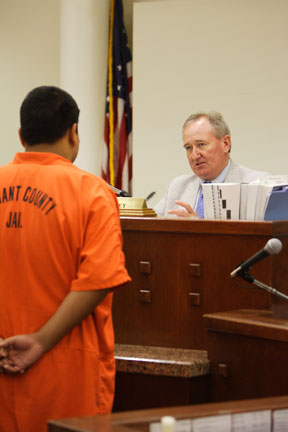 After Shannon and his first wife divorced, he stayed with Strickland for several months. As a roommate, Shannon was OK, Strickland said, “once he mastered the art of the washing machine.”
After Shannon and his first wife divorced, he stayed with Strickland for several months. As a roommate, Shannon was OK, Strickland said, “once he mastered the art of the washing machine.”
When Shannon returned to private practice after leaving the D.A.’s office, he first tried criminal defense work. He didn’t enjoy it, he said, in part because back then defense attorneys often had to put up bonds on their clients, which led to some ethical problems.
Shannon practiced family law for more than 30 years, until he tired of the stressful lifestyle.
Around that time, Curry had become unhappy with the way white-collar crimes were being prosecuted in his office. He offered Shannon a position as chief of the economic and computer crime unit. After four months of thinking about it, Shannon took a pay cut to rejoin the county office.
Now Shannon finds himself sitting behind the desk once occupied by his old friend.
“I have big shoes to fill, and I’m not sure I can fill them,” he said.
When Tim Curry first ran for D.A. in 1972, he campaigned as a reformer against his former boss, longtime D.A. Doug Crouch. When he won, Curry took over an office that had a reputation as corrupt and ineffective.
He expected to stay for only one term, Curry told Fort Worth Weekly a few years ago. But then he realized how much he enjoyed the work. Over the following 36 years, he built a legacy of efficiency and aboveboard dealings in his office and earned the informal title of “the dean of Texas prosecutors,” according to longtime associate Rob Kepple.
Kepple, director of the Texas District & County Attorneys Association, said that under Curry’s leadership the Tarrant office became an example for others around the state.
“It’s second to none,” he said. “I’ve been doing this since 1990, and the Fort Worth office has consistently had a reputation as one of the best offices in the state. As evidence of that, when people graduate from law school, they want to go work there. And the people who work there stay there and are loyal. They get great training, a lot of support; it’s a real professional office.”
According to Kepple and others, the integrity of the office and Curry’s eye for talent have made the Tarrant D.A.’s office stand out. Several sources said there are many attorneys who take jobs in other offices and wait for a position to open up in Tarrant. The steady flow of talent and training has paid dividends.
Even people who didn’t stay forever in Curry’s demesne – including one who made the only serious run at beating him at the ballot box – had mostly good things to say about the late prosecutor.
“Curry treated his lawyers as colleagues and friends. He could be an opponent and a gentleman at the same time. He was a complete professional in every sense of the word. He never did anything capricious or under the table,” said Mark Daniel, a longtime Fort Worth attorney and friend of both Shannon and Curry. “That’s a great heritage, and it’s a great reputation that the county has. Joe Shannon is cut from the same cloth.”
In his early years in office, Curry regularly prosecuted cases – partly out of necessity, since the office employed only 30 lawyers at the beginning. But after 1977, he left that part of the job to others. Some saw his leadership in absentia as a weakness of the office; others said it wasn’t – that he chose good people to work for him and delegated responsibility.
“If there was ever a criticism of Tim Curry – and it’s hard to find one – it was his lack of visibility,” said Daniel, referring to the fact that Curry didn’t try cases. “He rarely graced the halls of the courthouse. That was by choice, and it worked for him.”
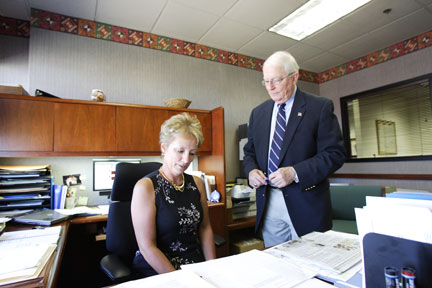 State District Judge Daryl Coffey, who worked as an assistant D.A. before taking the bench, said Curry would have spread himself too thin if he’d tried to prosecute cases himself as well as running the office. “It might have been good for esprit de corps, but I just don’t think it was his style,” he said.
State District Judge Daryl Coffey, who worked as an assistant D.A. before taking the bench, said Curry would have spread himself too thin if he’d tried to prosecute cases himself as well as running the office. “It might have been good for esprit de corps, but I just don’t think it was his style,” he said.
Coffey said that because of Curry, other counties patterned their D.A.’s offices after Tarrant. And he pointed to the example of Terri Moore, Curry’s former top assistant who twice ran against him unsuccessfully and who, in 2007, moved over to the Dallas County D.A.’s office.
Coffey said, and Moore agrees, that some of the first things Moore did in the Dallas County office were carryovers from Curry: She implemented an open files policy, which allows defense attorneys to see a prosecutor’s files before trial, and did away with presumptive evidence – that is, improperly using in court the results of preliminary field tests to determine whether or not a substance is an illicit drug, rather than using far more reliable lab reports.
Moore said she brought to Dallas a lot of the good things she learned in her 14 years in the Tarrant D.A.’s office, including innovative programs that Curry started. One of those was a pre-trial diversion program that is intended to allow first-time offenders to avoid trial on the condition that they complete a program of supervision.
Coffey said that the Tarrant D.A.’s office, under Curry, “always had a very fair and very firm deferred prosecution program on felonies and never would indict you on a drug case unless it had a drug analysis from the lab.
“They never did that presumptive stuff like in Harris and Dallas [counties],” he said.
Coffey scoffs at critics who allege that Curry cultivated a good ol’ boy system of justice that sometimes allowed those with connections to power escape prosecution.
“I’ve never seen it in the years I’ve been on the bench or as a lawyer,” he said. “As a prosecutor, I had some cases against some very wealthy people, and I’ve only ever been told to do what was right. I don’t think there is a good ol’ boy system in Tarrant County. I think one existed back in the old days before Curry. Back then, if you didn’t have the right lawyer, you could get different justice.”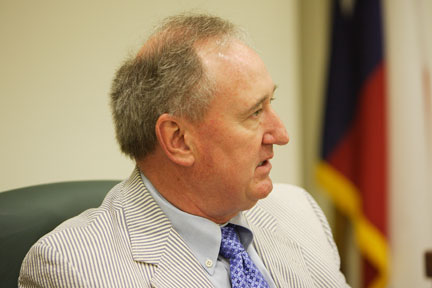
Moore and a few others say they’ve heard rumblings in the last few years about a growing tendency in Tarrant County for prosecutors to look for convictions at all costs, rather than for justice – and in some cases, to withhold evidence in order to reach that end.
“Something is going on – I’m not sure what it is,” said Moore, who many expect to go up against Shannon next year for the Tarrant top spot, if she doesn’t get an appointment to the U.S. attorney’s office. She said she’s heard similar complaints from several local defense attorneys. “It might just be that there’s been a change of the guard, and people don’t know their place yet,” she said. “You don’t protect the conviction if it’s not the right thing to do.”
Ironically, in the past it was Dallas County that had the conviction-at-any-cost reputation. Since Moore’s arrival and the election of new Dallas D.A. Craig Watson, 19 convictions have been overturned because of new DNA evidence.
“For years I’ve always heard the stories about the Dallas D.A.’s office and their ‘ends justify the means’ and ‘convict them on the front page and let them out on the back page’ mentality,” she said. “I thought, ‘Let’s see if we can make a difference over there.’
“But the defense lawyers who come over here say that Dallas became Tarrant and Tarrant became Dallas,” in that respect, Moore said. “And so I think that Tarrant has kind of rolled the clock back, and that criticism broke my heart.”
Shannon said that there are no such issues in Tarrant County.
“In terms of metropolitan areas, we have not had the [wrongful] conviction issues that Dallas has had,” he said. “Every now and then, things will come along, and we’ll find out that we’ve made a mistake, and it gets rectified. And that’s primarily a tribute to the way Tim ran his office and some of the processes that he put in place to make sure things didn’t happen that way.
“We’ve never convicted anybody of selling pool chalk around here,” he added, referring to the infamous Dallas cases, prosecuted in 2001, in which more than two dozen people, mostly Hispanic immigrants, were convicted of drug trafficking, based on the false reports of police officers. The alleged illegal drugs in their possession turned out to be pool chalk with trace amounts of cocaine. One officer was later convicted of lying in police reports, and criminal charges have been filed against two others.
Moore and others pointed to the Chelsea Richardson case as an example of how the Tarrant office has adopted a win-at-all-cost mentality.
Richardson, who was sentenced to death for murdering her boyfriend’s parents at their home in Mansfield in 2003, is currently on death row. Her attorney, Bob Ford, has alleged that the prosecutor for the D.A.’s office, Mike Parrish, illegally withheld a favorable psychological evaluation that could have helped Richardson’s case. A state district judge is now considering whether to remove Parrish and the Tarrant D.A.’s office from the case. Ford hopes to get a new trial for Richardson or a reduced sentence.
Shannon points out that his office turned the Richardson case over to the attorney general’s office, once Parrish’s actions came to light. Parrish has since retired from the office.
“There’s been some stuff that we didn’t know about and obviously didn’t condone,” he said.
Though their personalities differed, Shannon adheres to much the same management philosophy as his friend and predecessor. The new D.A. figures there’s not much broke, so not much to fix.
“We’re doing things the way they’ve been done, the way the policies have been set for a number of years in terms of just general day-to-day stuff,” he said in an interview. “As we run across things that can be tweaked or improved – reacting to changes in the law … we’ll work in that direction.
“Tim, over the years, ran a stellar ship, and we’re aboveboard and by the book,” he said. “I would say [the Tarrant D.A.’s office] compares favorably to anyone in the state without exception.”
He did say that there will be more of an emphasis on white-collar crime, though he believes that was never a weakness of his predecessor. He estimated that Tarrant County courts have more than $50 million in mortgage fraud cases pending.
Fallout from the subprime lending debacle over the last few years has flooded the D.A.’s office with cases involving mortgage fraud. In many of those cases, borrowers took advantage of a lending climate in which lenders made almost no attempt to verify information, such as annual income, listed in mortgage documents.
As head of the white-collar crime unit, Shannon took on all of the public integrity cases in the county, like that of the police officer who was spending counterfeit money while in office and a fireman who was buying weapons with tax money. Public integrity cases usually hit during election seasons, Shannon said, and he plans to continue Curry’s policy of not pursing such allegations until after the elections.
“The white-collar unit of our office is kind of a public integrity unit by default because nobody else will handle it,” he said, referring to the complicated nature of public integrity cases, which usually involve a paper trail and boxes of documents.
Shannon said he plans to personally try some cases, though he hasn’t taken on any since being appointed to the top job.
“I think Joe is going to find a way to make himself more visible, not that it’s a prerequisite for the job, but it’s good for staff morale, knowing there’s an elected D.A. overseeing everything,” Daniel said. “It’s kind of an interesting contrast … . It’ll be interesting to watch it happen in the next year and a half or so,” he said. “The main thing is that you want a D.A. who is careful with his decisions and careful with his power, and I think Joe fits that.”
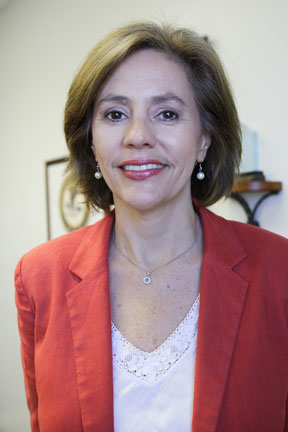 Shannon said he hasn’t decided whether or not he will run for election to the position in 2010. Curry ran unopposed for years until Moore, a Democrat, gave him a run for his money in 2002 and again in 2006.
Shannon said he hasn’t decided whether or not he will run for election to the position in 2010. Curry ran unopposed for years until Moore, a Democrat, gave him a run for his money in 2002 and again in 2006.
“After 46 years, you finally do develop some good judgment, some of which is based on bad judgment over the years,” said Shannon. “You learn from your mistakes and experience. Theoretically, the longer you do it, the more you know.”
Shannon said he doesn’t judge the success of his office by conviction rates but, in true Curry fashion, by how efficiently the cases are processed.
“We don’t judge our success on whether we win or lose. We judge it based upon whether we’re able to process and move 30,000 misdemeanor cases and 15,000 felonies in a year,” he said. “And that means everybody has got to be working.”
While Shannon is mulling over whether to run for a full four-year term, Tarrant County Democrats are licking their chops at the prospect of picking up that office. County chairman Steve Maxwell said that he believes the Dems have their best shot in years.
“No question about it,” he said. “That’s nothing negative about Joe. He’s a good friend of mine, and he’s a great guy. But without that incumbent and a well-known name in there, we certainly see the district attorney’s race as one that we have a chance of winning next time around.”
Maxwell said he’s hoping Terri Moore will run again. Moore, however, is one of several candidates for the position of U.S. attorney for the Northern District of Texas, a presidential appointment. She will likely be in limbo until that appointment is announced.
“If she doesn’t get that appointment, I’m really hoping that she is going to be our candidate,” Maxwell said. “I have reason to believe she would [run], but I think she’s pretty focused on that U.S. attorney position.”
Moore said that she wouldn’t rule out a run for the Tarrant office if the federal job falls through.
“I’ll just have to cross that bridge when I get there,” she said. “Right now I’m focusing my attention on the other aspects of my career. I have the honor of being considered by the White House right now, so I don’t want to get too many irons in the fire.”
Whoever the Democratic candidate turns out to be, Maxwell speculated that the campaign will be a tough one because of Shannon’s sparkling reputation.
“Tim did a great job, and Joe is a continuation of that,” he said. “In some ways it’s difficult for us to have to deal with that, but in some ways it’s good, because it’s time for a change, and that’s why we look at our chances of winning that race as being a lot better.”
Before he decides whether to make that run, Shannon said, he needs to answer a few of his own questions. For one, he said, he wants to make sure that he’s as healthy as he thinks he is. At 67, Shannon appears to have the energy and drive of a person half his age, but he’d like a doctor to confirm that.
Secondly, he wants to get comfortable in the job. So far so good, he said. It’s a little more time-consuming than he thought it would be, but, he said, that’s because his predecessor made it appear so effortless. And finally, he wants to make sure the voters of Tarrant County want him to run.
“I’ll get out and nose around the community a little and sense what the public might want,” he said. “But I haven’t had any reason to believe that the public wants the office to be run any differently than it has been, because everyone seems pretty satisfied with it.”
Shannon said that he still has a great passion for the job. He recalled a recent case in which he prosecuted a woman who stole the life savings of a mentally challenged man. After sentencing the woman to five years in jail, the jury passed around a hat to take up a collection for the victim.
“It’s just part of my career that I enjoy talking about, because maybe it sent a message that we’re not going to tolerate people taking advantage of the mentally challenged,” he said. “It’s one of those times where you really felt like you wore the white hat and accomplished something good.”











